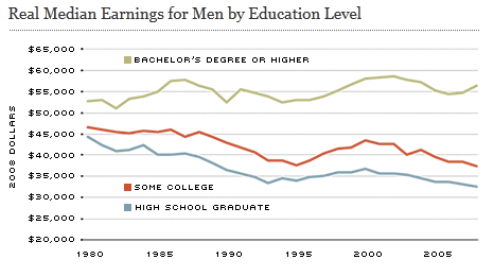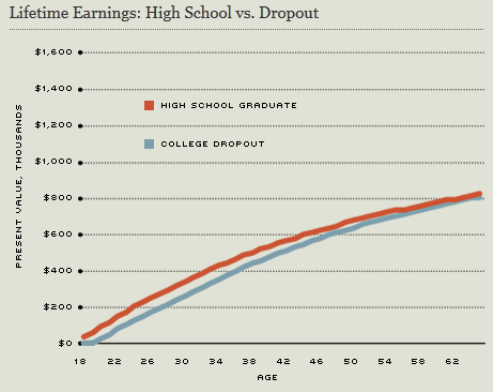Why "College for Everyone" Could Become a Dangerous Slogan
"You dropped one-hundred-and-fifty grand on an education you coulda got for a dollar fifty in late charges at the public library."
-- Will Hunting, from Good Will Hunting
There are lots of reasons to go to college. It broadens students' cultural horizons, opens them up to new fields of study, and for some, gives them a chance to exist outside of Mom and Dad's influence.
While we'd like to believe those are the most salient considerations, there's another important factor at play: College graduates are more likely to achieve greater financial success in the future.
Though improved accessibility to college has historically been a boon for Americans of all stripes, a recent report by the St. Louis Fed shows that we may be running up against the limits of what college can and can't do for our populace.
First, the good news
Between 1980 and 2000, the rate of high school graduates enrolling in college increased from 41% to 68%. A huge part of this can be explained by the growing gap between the lifelong earnings of those with a bachelor's degree and those without. Simply put, students don't want to be left behind.

Source: St. Louis Fed.
Increases in both merit-based and need-based scholarships also played a role.
It's especially heartening to note that those who needed financial assistance the most saw their ability to afford college increase significantly: "Students in low- and middle-income families have greater access to need-based grants and scholarships [than in 1980], which reduce the cost of education," stated the report.
And now, the not-so-good news
With the gap in earnings between college graduates and everyone else widening, it would seem (financially, at least) odd that anyone would choose not to pursue higher education. But digging beneath the numbers, it becomes clear why college isn't a one-size-fits-all proposition.
For starters, there's the distinct possibility of failure. As the Fed report makes clear, "even though a greater percentage of high school graduates enter college today than 30 years ago, this rise has not been met by a proportional increase in completion rates." A 2009 study found that about 50% of students who enroll in four-year public schools eventually withdraw.
If a hypothetical student were to drop out after two years, he would have a load of debt to contend with. Meanwhile, his buddy who decided to skip college has two wage-earning years under his belt and no college debt. By age 62, the student who decides to forgo college entirely still fares slightly better, financially, than the college dropout.

Source: St. Louis Fed.
What does this equate to?
Though we could discuss how our K-12 education system needs to do a better job in preparing students for college, that's beyond the purview of this article.
Instead, when up to 50% of students are dropping out of college while the costs of tuition increase, we have to collectively ask ourselves when enough is enough. For-profit schools have already preyed on both the government and low-income students who are now under a mountain of debt.
There is still strong evidence that graduating from college is a good indicator of future financial success. But even now, some are beginning to wonder if that will always be true.
If everyone has a bachelor's degree, escalation toward a master's is right around the corner. With our nation's student-loan debt reaching the $1 trillion mark this year, one has to wonder how much more strain the system can inflict on our pocketbooks.
Educational institutions used to be the gatekeepers for knowledge. If you wanted to follow the well-worn paths to success, college was an easy decision. But with the advent of the Internet, there really aren't any gatekeepers left. This isn't to say that going to college is silly; but one has to wonder if the push toward "college for all" will really lead us to a better society, or -- in the end -- just a more indebted one.
At the time thisarticle was published Fool contributor Brian Stoffel isn't against the idea of college, just against the idea that it's the "only" way to find your way in life. You can follow him on Twitter, where he goes by TMFStoffel. Try any of our Foolish newsletter services free for 30 days. We Fools may not all hold the same opinions, but we all believe that considering a diverse range of insights makes us better investors. The Motley Fool has a disclosure policy.
Copyright © 1995 - 2012 The Motley Fool, LLC. All rights reserved. The Motley Fool has a disclosure policy.

